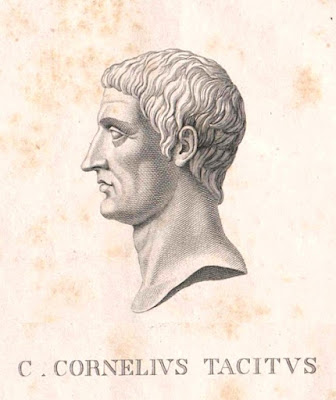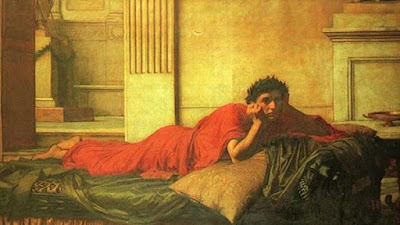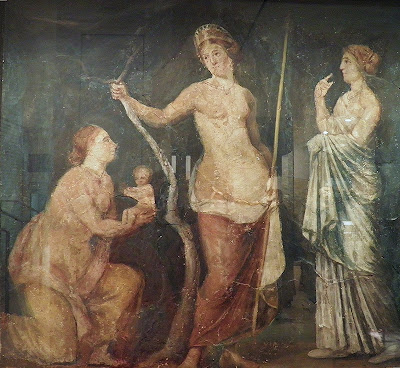Emperor Nero - Monster or Victim?
The Biographers
The ancient historians Tacitus, Suetonius, and Cassius Dio, are responsible for the historical accounts of Nero’s reign that have survived to this day. It is important to note that none of the works were written during Nero’s lifetime. Emperor Nero died in AD 68. Suetonius was born in AD 70, Tacitus in AD 56, and Cassius Dio in AD 155. Their partiality to the facts is suspect, relying on hearsay. It is important to remember history is written by the victors and is not always accurate.
Family History
To understand Emperor Nero’s mindset or genetic predisposition, as some may claim, we must immerse ourselves into the political arena of the Roman Empire, where the wrong choice could result in ruin or death.
Emperor Tiberius’s heir, the future Emperor Caligula, spent most of his youth on the Isle of Capri. He witnessed first-hand continuous plotting, paranoia, assassination attempts, and sexual deviancy while trying to stay alive as his uncle silenced his opponents, including Caligula’s mother and brothers.
When Emperor Caligula came to the throne, he ordered his sisters to return to the Imperial Court, which included Agrippina, mother of Emperor Nero. After recovering from an illness that changed Caligula’s personality, Agrippina and her sister plotted against their brother, but the attempt failed. Agrippina was exiled to the Pontine Islands while her son was sent to Calabria to live with his paternal aunt.
Upon the death of Emperor Caligula, Claudius became Emperor. He recalled Agrippina and Nero to the Imperial Court. The mother and son reunion greatly impacted the young Nero. He observed the power struggle between his mother and Messalina, the wife of Claudius, as their ambitions clashed, each wanting the throne for their son.
Agrippina’s obsession never faltered. She survived the assassin’s hand, manipulated powerful men, including her Uncle Claudius, whom she eventually married. Once Nero was named heir to Caesar’s throne, Claudius died unexpectedly after eating poisonous mushrooms. Shortly thereafter, Claudius’s son, Britannicus, died after suffering a seizure. Nero’s rule was now secure.
Childhood
Imagine a four-year-old child being torn from his mother and sent away to a holding 350 miles south of Rome. What thoughts must have run through young Nero’s mind when he found himself alone, surrounded by strangers who probably kept their distance, fearing reprisal from Caligula?
During that formative year, Nero lived among the slaves, playing with the children, helping in the fields, crying himself to sleep, lonely and afraid.
In all probability, the slaves pitied the child, ignored by his relatives, and treated him as one of their own.
Nero’s adjustment to his new station in life unraveled with his return to the Imperial Court. For a second time, the child’s stability was uprooted. Instinctively, he clung to his mother, not knowing his part in a dangerous game being played.
Did Agrippina instil fear into his impressible mind, telling her son only she could save him, causing his dependency?
The Imperial Court
Nero’s education befitted his rank. He loved the arts and enjoyed writing poetry, playing instruments, and singing songs. Wearing costumes while acting in Grecian plays endeared him to his tutors, and the people admired his athletic prowess.
However, during this time, Nero lost his innocence, learning the machinations of government, and the lengths to keep power, greed overshadowing equality, the privileged few ignoring the rule of law.
Did he suspect his mother’s part in the demise of Messalina? Who had alerted Claudius about his wife’s licentious affairs? Did Agrippina manage to lace the mushrooms with poison after the food had been tasted? What part did she play in Britannicus’s death, if any?
Nero watched the events play out silently while absorbing the seeds of power. This aphrodisiac would evolve, becoming insatiable, following a familiar path as his uncles before him.
Emperor
The first five years of Emperor Nero’s reign showed a young man caring for his people. He lowered taxes and gave more authority to the Senate. He created programs for the Arts and made changes to the slave laws. Later in his reign, he provided Fire Relief when most of Rome lay in ruins.
Unfortunately for Agrippina, her son grew up, and with maturity came annoyance at her meddling. His mother was an adept politician with excellent ruling skills. When she refused to pass the torch, friction followed.
There were many arguments between mother and son as Nero spread his wings. But Agrippina met her match with Nero’s current wife, Poppaea. This power struggle could only have one outcome, and Agrippina would not be victorious.
Did Nero arrange for the execution of his mother? In all probability, Poppaea was involved from the beginning. Agrippina survived many assassination attempts, but her days were numbered. When she did not drown after her boat sank, soldiers were sent to finish the job. She either died by her own hand or by a guard’s sword.
This unfortunate decision plagued Nero for the rest of his life. Rumors spread that Agrippina’s ghost haunted the emperor’s dreams. His sanity remained in question.
Poppaea felt threatened by Nero’s former wife, Octavia, who he divorced after charging her with adultery. But Poppaea would not rest until she had Octavia’s head on a platter. Once exiled, Nero ordered his guards to execute the daughter of Claudius and bring Poppaea her head.
And gossipmongers repeated bone-chilling tales of Octavia’s ghost joining Agrippina’s apparition in Nero’s bed-chamber, causing him to cower beneath a pillow.
The people blamed their emperor for the Great Fire, accusing him of setting the flame freeing land to build his Golden House. Did Poppaea suggest that her husband accuse the Christian sect of starting the fire? A perfect ploy to keep the emperor in the people’s good graces. And the idea worked. Culpability shifted, condemning the followers of Christ to death.
Popular Misperceptions:
Kicking a pregnant wife to death
Although Nero had violent outbursts, there were no witnesses to the alleged attack on his pregnant wife, Poppaea. In all probability, she died in childbirth.
Death of Britannicus
Modern historians have disputed the ancient text that Nero had poisoned his stepbrother, threatening his succession. Scientists have also challenged this claim. It has been argued that since Britannicus suffered from epilepsy, the condition caused his death by obstructing his airway.
Nero fiddled while Rome burned
Fiddles did not appear until the Middle Ages. Furthermore, Nero was away at his villa in Antium (modern-day Anzio) when the fire started at a merchant’s stall near the Circus Maximus. When word reached the emperor, he rushed back to Rome, fighting the blaze and providing temporary housing for the displaced citizens.
People are a product of their environment. The mores of the first century are very different from the twenty-first century. Although the brutality of the time cannot be condoned, the reality of the times explains why.
Nero was not born a monster, yet the genetic predisposition argument says otherwise, especially since similar traits were evident with his uncles, Tiberius and Caligula.
Nero had been in love with a slave whom he wanted to marry, wishing to live out their days in Greece before Agrippina sent her away. Without his love’s wise counsel, Nero followed his mother’s advice, choosing power and wealth no matter the cost.
He had been sensitive to the plight of the poor and the treatment of slaves. Even at his death, the citizens of Rome loved their Emperor they had compared to Adonis. Perhaps, Nero was not completely lost?
Somewhere the good-natured boy turned into a suspicious man after realizing the dangers of wearing Caesar’s crown. Self-survival meant eradicating one’s enemies. That was the world Nero lived in. Should he have attempted to change the system? Would he have stayed in power if he had tried?
I mourn for the ruler that might have been.
Traian Aelius Protacius
Forgiving Nero











No comments:
Post a Comment